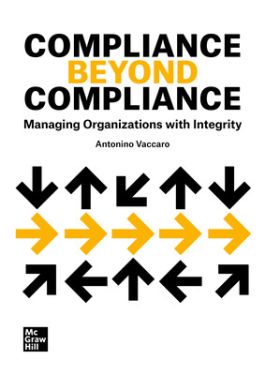Compliance beyond Compliance
1.ª Edición
8448637453
·
9788448637453
© 2022 | Publicado: 1 de Diciembre de 2022
This book proposes an alternative approach to compliance that goes far beyondthe traditional vision of the current jurisprudential and organizational doctrine byemphasizing the central and fundamental relevance of people (workers, customers,partners,…
Leer más
1. Compliance programs and the importance of ethics.
2. A model of ethical-legal analysis of "sensitive" organizational problems.
3. Fraud in organizations.
4. Managing people responsibly and with dignity.
5. Responsible information management.
6. Environmental sustainability.
7. Compliance beyond compliance.
Conclusions.
2. A model of ethical-legal analysis of "sensitive" organizational problems.
3. Fraud in organizations.
4. Managing people responsibly and with dignity.
5. Responsible information management.
6. Environmental sustainability.
7. Compliance beyond compliance.
Conclusions.
This book proposes an alternative approach to compliance that goes far beyond
the traditional vision of the current jurisprudential and organizational doctrine by
emphasizing the central and fundamental relevance of people (workers, customers,
partners, etc.) in organizations.
Compliance can, in fact, be used strategically to create organizations that favor the
integral development of people through the creation of a business culture based on
ethics and integrity, the training of workers (and possibly other stakeholders, such as
customers) and the structuring of rules of conduct that induce virtuous behaviors.
the traditional vision of the current jurisprudential and organizational doctrine by
emphasizing the central and fundamental relevance of people (workers, customers,
partners, etc.) in organizations.
Compliance can, in fact, be used strategically to create organizations that favor the
integral development of people through the creation of a business culture based on
ethics and integrity, the training of workers (and possibly other stakeholders, such as
customers) and the structuring of rules of conduct that induce virtuous behaviors.

